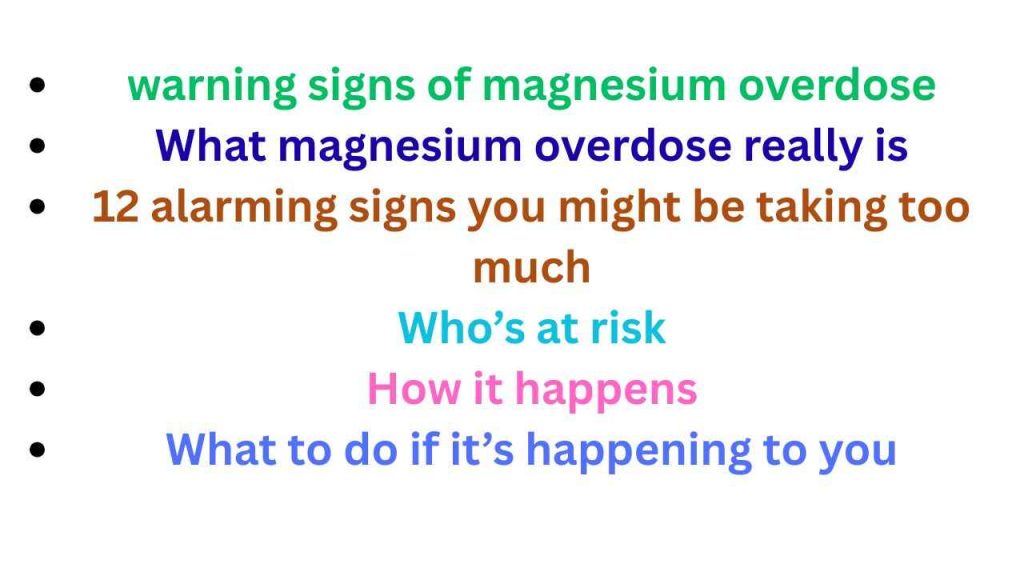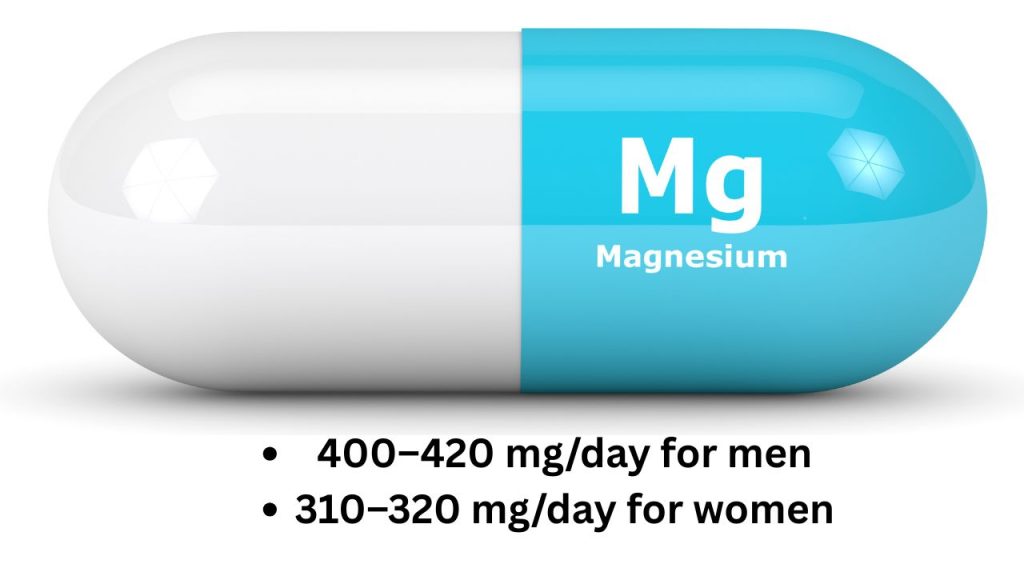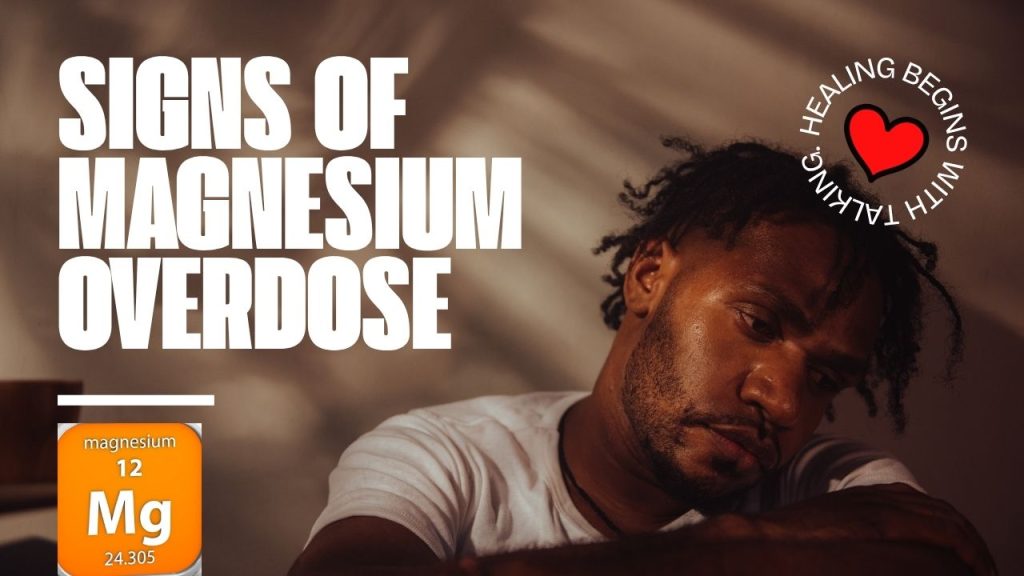Magnesium is essential for health, but too much can be dangerous. Learn the warning signs of magnesium overdose, how it happens, and what to do about it in this complete guide.
Introduction: Why Magnesium Is a Double-Edged Sword
We can admit that magnesium is one of those minerals that deserves a lot of praise. And with much justification. It assists in muscle activity, sleep, less anxiety, improves digestive health, and even cardiovascular health. No wonder these days people are eating magnesium supplements like so many candy pills.
The thing is…
Too much of a good thing can turn into a real problem. That includes magnesium.
Excessive amounts of it are, indeed, bad, especially in supplement form, and that is where it can cause dental health issues. The term used to describe the condition is magnesium overdose, or hypermagnesemia, scientifically.
In this article, we’ll talk about

- warning signs of magnesium overdose
- What magnesium overdose really is
- 12 alarming signs you might be taking too much
- Who’s at risk
- How it happens
- What to do if it’s happening to you
Let’s dive right in.
What Is a Magnesium Overdose?
Magnesium overdosing. Magnesium overdose happens when a person has excess magnesium in the body as a result of high-dose supplementation or specific medical conditions.
Your kidneys tend to be excellent at removing the extra magnesium that you consume in food. However, under the stress of being overworked (or when you are adding an excess supplement to the point of it being absurd), the magnesium levels in their system can get excessive and hence cause toxicity.
This is not normal, but when it occurs, it becomes dangerous.
How Much Magnesium Is Too Much?

According to the National Institutes of Health (NIH):
- The Recommended Daily Allowance (RDA) for adults is:
- 400–420 mg/day for men
- 310–320 mg/day for women
- The Tolerable Upper Intake Level (UL) from supplements (not food!) is:
- 350 mg/day
Here’s the catch: It’s almost impossible to overdose on magnesium from food alone. But it’s surprisingly easy with magnesium supplements, especially if you’re combining pills, powders, and fortified drinks.
Who’s at Higher Risk about Signs of Magnesium Overdose?
Some people need to be extra careful. You might be at risk if:
- You have kidney disease (your body can’t filter excess magnesium)
- You take laxatives or antacids containing magnesium
- You use magnesium-based IV drips
- You’re on high-dose supplements for anxiety or migraines
- You have heart problems or low thyroid
Now, let’s get into the real meat: the signs your body is telling you to slow down on the magnesium.
12 Clear Signs of Magnesium Overdose
1. Nausea and Vomiting
Feeling queasy? It might be the first signal that your stomach is not agreeing with what you ate when it goes to work after taking a magnesium supplement.
The reason why it happens: Too much magnesium takes water into your intestines and agitates the tank, making you feel nauseated and even to vomit.
What to do: Lessen the supplement and drink plain water. When there is continuous vomiting, visit a physician.
2. The Never-Give-Up Diarrhea
Chronic diarrhea is also one of the most common and unnoticed symptoms of excessive magnesium levels.
The reason it occurs: Magnesium is commonly taken as a laxative (Milk of Magnesia). However, excessive use causes diarrhea and the feeling that you have to go to the bathroom too often.
Not normal: In case you are going more than three times to the toilet following magnesium consumption, that is an alert.
3. Hypotension or Low Blood Pressure

Dizzy on getting up? Blurry vision? You are likely to suffer from low blood pressure.
The reason behind this is that magnesium relaxes the blood vessels. Overloaded, and your vessels go too slack, with the result that your blood pressure is dangerously low.
Watch for:
- Fatigue
- Fainting
- Cold hands and feet
4. Muscle Weakness or Lethargy
Ironically, while magnesium is supposed to support muscle function, too much of it has the opposite effect.
Signs to watch for:
- Muscles feel like jelly
- Difficulty climbing stairs or lifting things
- General sluggishness
If it’s hard to move and you haven’t changed anything in your routine—magnesium might be the issue.
5. Irregular Heartbeat
Your heart needs the right balance of magnesium to maintain rhythm. Too much disrupts that balance.
Symptoms:
- Fluttering feeling in your chest
- Skipped beats
- A slow pulse
In severe cases, magnesium overdose can cause bradycardia (very slow heart rate) or even cardiac arrest. This is not something to ignore.
6. Confusion or Mental Fog
If you’re suddenly forgetting simple things or can’t think clearly, excessive magnesium might be affecting your central nervous system.
Other cognitive signs:
- Trouble concentrating
- Slurred speech
- Feeling disconnected
7. Difficulty Breathing

Yes, too much magnesium can impact your breathing. When magnesium builds up in the blood, it can weaken the muscles involved in respiration.
Warning signs:
- Shallow breathing
- Shortness of breath
- Chest tightness
8. Facial Flushing
Red, hot face or skin? That might be your body trying to cool down from internal changes caused by high magnesium.
Accompanied by:
- Sweating
- Warmth in the upper body
- Dizziness
This usually happens shortly after taking a large dose.
9. Blurry Vision or Double Vision
Your eyes rely on neuromuscular coordination. Excess magnesium can mess with those signals.
Look out for:
- Temporary loss of clear vision
- Seeing double
- Difficulty focusing
10. Urine Changes
You may notice:
- Less urine output
- Dark-colored urine
- Trouble urinating at all
That’s often a kidney warning sign. If your kidneys are overwhelmed by too much magnesium, it shows up here first.
11. Tingling or Numbness
Pins-and-needles or a strange numb feeling in your limbs? That’s a neurological sign your magnesium levels are out of whack.
Especially if you feel:
- Numbness in your hands or feet
- Tingling around your lips or tongue
- Weak grip
12. Coma or Unconsciousness (in extreme cases)
It’s rare, but in severe cases — especially in people with kidney failure — magnesium toxicity can lead to coma or death.
If someone collapses or becomes unresponsive after taking magnesium, call emergency services immediately.
How Is Magnesium Overdose Diagnosed?

Doctors will typically:
- Inquire about prescription drugs or supplements.
- To find out your serum magnesium level, get a blood test.
- Keep an eye on your heartbeat and kidney function.
Magnesium levels should be between 1.7 and 2.3 mg/dL. An overdose may be indicated by anything.
How Is It Treated?
Depending on the severity, treatment options may consist of the following:
- Immediately quitting the use of magnesium
- IV fluids to eliminate excess
- Intravenous calcium gluconate (in counteracting magnesium)
- Dialysis (kidney patients)
The sooner it is detected, the easier it is to cure.
How to Prevent Magnesium Overdose
You don’t have to fear magnesium—but you do need to respect the dose. Here’s how to stay safe:
Talk to Your Doctor Before Supplementing
Especially if you have kidney issues, heart conditions, or take medications like diuretics or blood pressure pills.
Stick to the Recommended Daily Dose
Don’t exceed 350 mg/day from supplements, unless specifically prescribed by a doctor.
Know Your Sources
Magnesium hides in:
- Laxatives
- Antacids
- Energy drinks
- Sleep teas
- Multivitamins
Check labels carefully.
Eat Your Magnesium!

Getting magnesium from food is safe and healthy. Great sources include:
- Almonds
- Spinach
- Avocados
- Black beans
- Whole grains
- Bananas
Learn how this golden drink can reduce pain.
FAQs: Magnesium Overdose
Q1. Is it possible to overdose on magnesium tablets through foods?
No. Natural food sources of magnesium are filtered in your kidneys. An overdose only takes place through supplements or treatments.
Q2. What is the time to appear of magnesium overdosing symptoms?
Typically, in just a matter of hours, in case you have overdosed. The first noticeable symptoms of some include digestive problems.
Q3. Which form of magnesium is the most likely to induce an overdose?
Magnesium oxide, as well as magnesium citrate and magnesium sulfate, can be more of a problem, particularly in large doses.
Q4. Do I need to go cold turkey on magnesium supplements?
Not necessarily. Magnesium matters! Simply run amok–and ask your physician first.
Q5. Is magnesium overdose fatal in kids?
Yes, but not very common. Excessive doses of magnesium-containing laxatives in children may lead to the occurrence of diarrhea and other effects.
In conclusion:
Magnesium superstar mineral, though, like any other, will lose its status as a superstar as long as we don’t keep it in line.
It is good when you are taking magnesium for health benefits. However, pay attention to your body. Be aware about warning signs of magnesium overdose the and its symptoms, take the appropriate dosage, and whenever you are uncertain, speak to a medical practitioner.
More is not better when it comes to your health. Stay Healthy.




